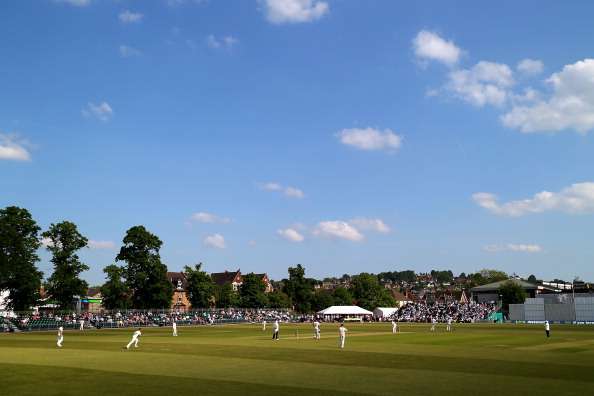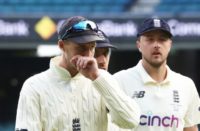Tree-lined Guildford still able to deliver the festival fun for Surrey
Dan Whiting’s journey through cricket’s more unlikely venues takes him through Surrey
Think of Surrey and images are conjured up of urban South London, the Northern Line spitting out another few hundred paying cricketing spectators from the bowels of the Oval tube station and of the gasometer perched over one side of the ground, having witnessed some of the finest cricketers ever to have played. A quick bit of research, though, shows that Surrey have used many more outgrounds than you’d think.
Let’s start our tour at the one that is still in use today. Woodbridge Road in Guildford is much-loved among the county faithful and by batsmen throughout the world. A combination of an excellent batting track and small boundaries, especially square of the wicket, have made this a venue at which numerous high scores and records have been established.
Justin Langer rattled up an impressive 342 for Somerset in 2006 as the visitors declared on 688-8. Surrey responded with 717.
Alistair Brown peppered the crowd here in 1997 as he smashed a quickfire 203 in a Sunday League 40-over game.
Scores of 200 in one-day cricket might not be regular but they are not wholly surprising in this modern era of big bats, small boundaries and T20 cricket. Back in 1997 it was unheard of, however, as the swashbuckling Surrey opener set the precedent.
Guildford CC are the hosts for this extremely popular festival that staged its first county game in 1938. Hampshire and Sussex have been the most regular visitors but every county has had their turn at this tree-lined venue, along with Oxford and Cambridge University.
Warwickshire completed the ‘full house’ in 1992 with Allan Donald picking up six wickets. Two years later a full house, attendance-wise, watched Brian Lara, fresh from his 501 against Durham.
Unfortunately scores of 2 and 44 left the crowd to marvel at the glory of an Andy Moles double hundred instead.
While Guildford may have a reputation as a batting paradise, one bowler who bucked the trend was Martin Bicknell. In the town where he was born, the Surrey seamer took 16-119 in the match against Leicestershire in 2000, recording 9-47 in the second innings.
Guildford may be a small ground but it is an atmospheric arena. A small row of seating lies in front of the pavilion for the Surrey membership whilst marquees dot the ground. Crowds of only 1,500 generate a brilliant atmosphere as the tree-lined ground has an amphitheatre effect on the noise. It is a reason why it is one of the most popular venues on the outground circuit and why Surrey still use it despite the costs of setting up the seating and a variety of other logistics behind festival cricket, when they have a 26,000-seat stadium back home.
Whitgift School, on the fringes of Croydon, is another venue that the Brown Caps have used. With peacocks roaming the grounds along with some flamingos, maras and a host of other fauna not especially associated with South Croydon, it is a most unusual cricketing venue. Many talented cricketers have played in their formative years on this wicket.
Danny Cipriani, no mean cricketer by all accounts, was one but Laurie Evans, Jason Roy, Dominic Sibley and David Ward all attended this fine educational establishment which has acted as a production line for professional cricketers since the days of Raman Subba Row.
Whitgift only started hosting first-class fixtures at the turn of this century and in the first four-day game in 2004, Nottinghamshire were hammered by the hosts as Mark Ramprakash thrashed 279 not out in a total of 693. The visitors lost by the small margin of and innings and 211 runs.
Lancashire fared slightly better the following year losing by an innings as Surrey scored 525, Ramprakash this time scoring a mere 134. It was on this run-feast of a ground that Graham Napier smashed 16 sixes on his way to 196, equalling the then first-class record by Andrew Symonds at Abergavenny.
A quaint pavilion and a chapel are the mainstays of this ground but one of the reasons that is behind its popularity is natural banking around the boundary. Many grounds around the world had grass banks which have been replaced by concrete, monolithic, characterless stands. Those venues are poorer for their loss in my opinion but this charming venue proves they can make a natural amphitheatre.
The ground may not be Roman but the Surrey Lions have had some gladiatorial battles in this arena. Shaded areas for spectators complete this beautiful venue, although the vista does depend on your seat in the ground; church spires one way, whilst a view towards tower blocks in Croydon is offered in the other direction. Whitgift is where old meets new. Unfortunately the county didn’t have a game there in 2012 due to building work and the Olympics and have never returned. It is a shame because it is one of the most beautiful grounds on the circuit.
Charterhouse School, where Peter May was educated, was used in the early Seventies. A stunning view from square leg at one end greeted the visitor as the spires of the college provided the backdrop. Another ground used in Godalming was Broadwater Park, home of Farncombe CC. It held a singular first class game in 1854 between Surrey and Notts, although East Sussex played West Sussex there in 1827.
East Molesey is a beautiful little village on the banks of the Thames that has been swallowed up by suburban London. Sitting opposite Hampton Court, Surrey played there in 1983 for a single fixture although the touring Australians played Hurst Park CC here in 1890. The home of East Molesey CC now, it is a classically English venue, just a short six hit to the Thames which flows past the ground.
A mile or so away is Imber Court, home of the Met Police Sports Club. The boys in blue have four sports grounds based just outside London at Chigwell in Essex, Bushey in Hertfordshire and Hayes in Kent but this is the only one to have hosted county cricket, albeit for a couple of T20 matches before Surrey saw the corporate worth that 20,000 inside the Kia Oval could generate.
Imber Court has fine facilities yet lacks Hurst Park’s character and warmth.
Another ground close to the famous river that winds its way through the commuter belt of Surrey is Kenton Court Meadow, home of Sunbury CC.
A town that has changed between Surrey and Middlesex over the years, Sunbury play in the Surrey League yet have provided the likes of David Nash, Richard Johnson, Jamie Hewitt and Toby Roland-Jones for Middlesex in recent years.
Surrey isn’t all just commuters, though.
The works ground of Decca, the radar company based in Tolworth staged first class action in 1973 and the British
Aircraft Corporation Sports Ground in Byfleet saw numerous games during the same decade. Leyland Motors in Kingston was used just after the Second World War and in the late Sixties, in Cheam, a benefit match for John Edrich was the first game televised in colour.
Banstead, Sutton and Reigate Priory have been tried and tested by those from SE11 on their country jaunts.
Surrey do venture from the Oval from time to time but the cost of festival cricket, when you have the third biggest ground in the country, is a hard one to explain to the members. It’s a shame because there are some delectable cricket grounds in this neck of the woods.
Besides Surrey represent the whole county, not just South London.
This piece originally featured in The Cricket Paper, September 9 2016
Subscribe to the digital edition of The Cricket Paper here















